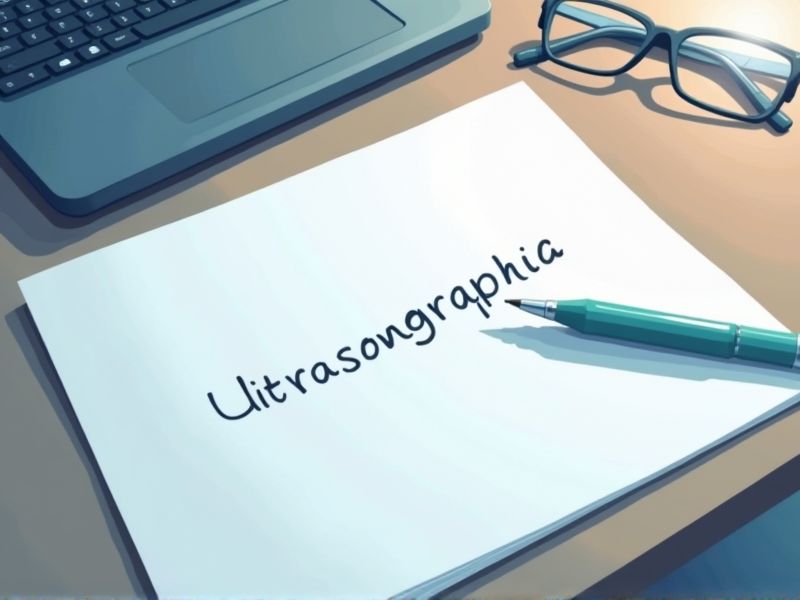
Ultrasonography Technicians are entrusted with capturing diagnostic images that are vital for patient assessments, making precision and expertise crucial. Certifications ensure that these technicians possess the necessary skills and understand best practices to deliver accurate results. They also build trust among patients and medical teams by validating the technician's capability to handle advanced equipment safely. Below are some key certifications essential for an Ultrasonography Technician.
ARDMS Registered Diagnostic Medical Sonographer (RDMS)
The ARDMS RDMS credential ensures that ultrasonography technicians possess a standardized level of proficiency and knowledge. This credential signifies adherence to rigorous industry standards, enhancing diagnostic accuracy and patient safety. Hospitals and clinics often prefer hiring certified technicians as it reduces liability and instills trust among patients. RDMS certification often leads to better career prospects and potentially higher salaries for sonographers.
ARDMS Registered Diagnostic Cardiac Sonographer (RDCS)
An ARDMS Registered Diagnostic Cardiac Sonographer (RDCS) credential ensures that a technician possesses the specialized knowledge required for high-quality cardiac ultrasound imaging. This certification validates the individual's proficiency in identifying and assessing cardiac conditions, which directly impacts patient diagnosis and treatment plans. Employers and healthcare facilities often seek RDCS-certified professionals to meet stringent regulatory and industry standards in patient care. Lack of this certification may lead to misdiagnosis or suboptimal patient outcomes due to insufficient expertise.
ARDMS Registered Vascular Specialist (RVS)
Becoming an ARDMS Registered Vascular Specialist (RVS) ensures proficiency in vascular technology, which is critical for accurate diagnosis in ultrasonography. This certification validates a technician's expertise in vascular anatomy and pathology, leading to improved patient outcomes. Hospitals and clinics may require the RVS credential to maintain high standards of care and meet accreditation requirements. Achieving RVS status enhances a technician's professional credibility and career advancement opportunities within the field of ultrasonography.
ARDMS Registered Vascular Technologist (RVT)
The ARDMS Registered Vascular Technologist (RVT) certification ensures that ultrasonography technicians possess specialized knowledge and skills in vascular sonography. This credential validates a technician's ability to perform accurate vascular assessments and identify pathologies effectively. Hospitals and clinics benefit from hiring RVT-certified professionals as it enhances the quality of patient care. Adherence to established standards in ultrasound practices often leads to reduced diagnostic errors and improved patient outcomes.
CCI Registered Cardiac Sonographer (RCS)
The CCI Registered Cardiac Sonographer (RCS) credential enhances the credibility of an ultrasonography technician by validating their expertise in cardiac ultrasound procedures. This certification ensures proficiency in the interpretation and execution of echocardiograms, critical for accurate diagnostic assessments. Hospitals and clinics often require certified professionals to meet quality and performance standards. Patients benefit as well, experiencing increased confidence in the diagnostic process due to the technician's certified skills and knowledge.
CCI Obstetrics and Gynecology Sonographer Certification
The CCI Obstetrics and Gynecology Sonographer Certification enhances credibility among employers and peers, leading to better job prospects in a competitive healthcare landscape. It signifies a specialized skill set in maternal-fetal imaging, which is critical for accurate diagnoses and patient care. Certified technicians are more likely to adhere to industry standards, ensuring consistent and high-quality sonographic evaluations. Facilities may prefer certified professionals as part of accreditation requirements, impacting staffing decisions in clinical settings.
Basic Life Support (BLS) Certification
Basic Life Support (BLS) certification equips ultrasonography technicians with skills necessary to respond effectively to cardiac emergencies during patient care, enhancing overall safety. In clinical settings, technicians may encounter patients who experience sudden health crises, requiring immediate intervention. BLS training increases the technician's competence in performing CPR, automated external defibrillator use, and other life-saving measures. Many healthcare institutions mandate BLS certification to ensure all staff are prepared for emergencies, aligning with protocol standards.
Advanced Cardiac Life Support (ACLS) Certification
Advanced Cardiac Life Support (ACLS) certification is essential for ultrasonography technicians because they often work in emergency and critical care settings where patients might experience cardiac events. By acquiring ACLS skills, technicians can respond swiftly and effectively to life-threatening cardiac emergencies when performing procedures such as echocardiograms. The certification enhances their ability to collaborate with medical teams in stabilizing patients and ensuring continuity of care. Hospitals and clinics prefer hiring technicians with ACLS certification to improve patient safety and clinical outcomes.
Ultrasound Physics and Instrumentation Certification
Ultrasound Physics and Instrumentation Certification is essential because it ensures that technicians have a thorough understanding of the principles governing sound wave interactions and image formation. Correct interpretation of ultrasound images heavily relies on the technician's expertise in differentiating artifacts from actual anatomical structures, a skill honed through certification. Accreditation signifies that the technician is capable of operating sophisticated ultrasound equipment efficiently and safely, minimizing patient risk. Certification often leads to increased job opportunities and credibility within the medical community.
Medical Ultrasound Safety Certification
Medical ultrasound safety certification ensures that ultrasonography technicians adhere to standardized safety protocols, minimizing potential harm to patients. This certification provides technicians with updated knowledge about operating equipment safely, reducing the risk of misdiagnosis due to operator error. It instills confidence in patients, assuring them of receiving safe and reliable imaging services. Certification also helps in maintaining professional standards, fostering trust and credibility within the healthcare industry.
Summary
With additional certifications, you can enhance your employment prospects, accessing a broader range of job opportunities. Your expertise will increase, potentially leading to higher salary prospects and career advancement. Certification validates your specialized skills, improving your credibility with employers and patients. Continuous learning through certifications keeps you updated with evolving technology and practices in ultrasonography.
